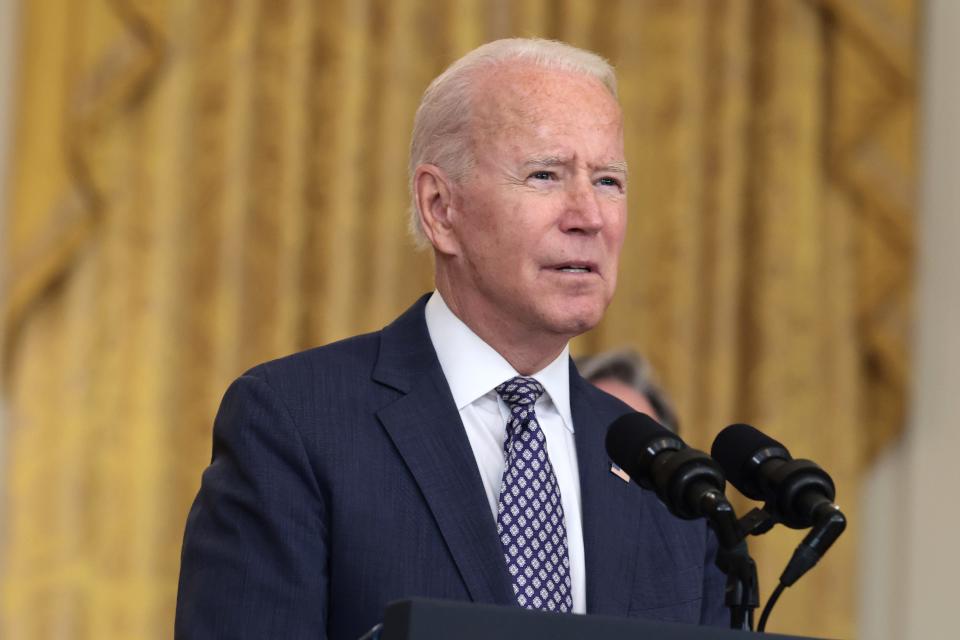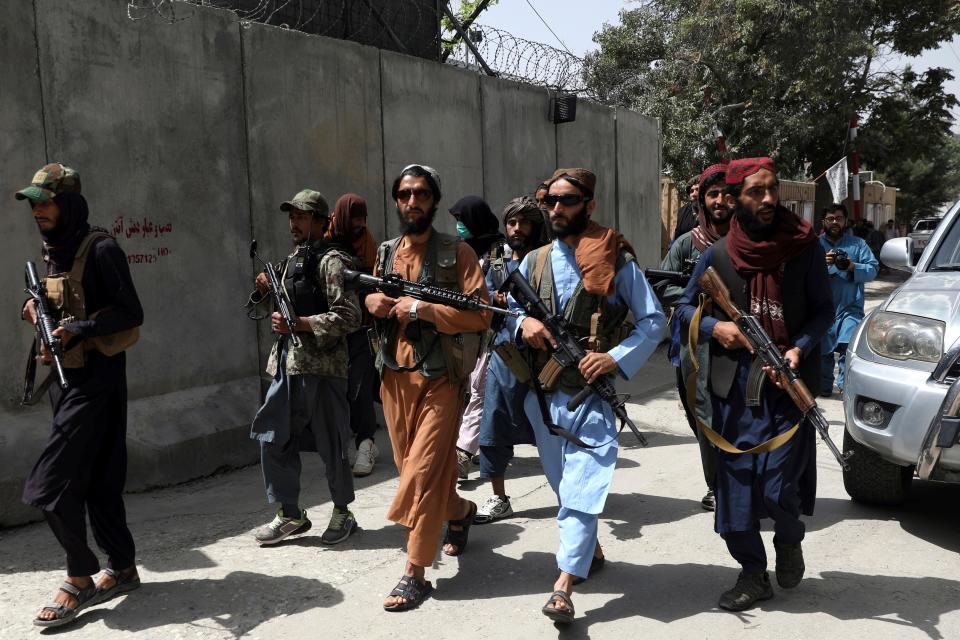For Biden, fallout from the Afghanistan withdrawal abroad complicates agenda at home
- Oops!Something went wrong.Please try again later.
WASHINGTON – Joe Biden campaigned in last year's presidential race on restoring order and competence in the White House after four years under Donald Trump. He called his predecessor's behavior and policies "erratic" and framed his own four decades of Washington experience as a return to principle, professionalism and thoughtful decision-making, particularly on foreign policy.
An adult is back in the White House, his supporters often said.
But the president's chaotic withdrawal from Afghanistan – followed by finger-pointing from Biden and military leaders – has damaged his pledge of steady, competent leadership at a critical moment as he presses an ambitious domestic agenda with a razor-thin margin in Congress.
The fallout comes as Biden looks to win congressional approval in the coming weeks for his $1 trillion infrastructure plan and a $3.5 trillion budget proposal packed with liberal priorities ranging from Medicare expansion to subsidized child care.
Biden has perhaps less political capital than at any other time in his presidency. Even before the Taliban takeover of Afghanistan, his approval ratings had begun slipping below 50% in multiple polls – an important marker historically, but especially before next year's midterms when Democrats will try to retain control of Congress.
More: How did Afghanistan end this way? The finger-pointing begins
"This thing politically, it's bad now," Mike Murphy, a longtime GOP strategist who backed Biden in the election, said last week on his podcast with David Axelrod and Robert Gibbs, former aides in President Barack Obama's administration. “This is the guy who ran on, ‘I've been around foreign policy for 45 years. I know what to do.’”
Murphy called the scenes of Afghans clinging to U.S. aircraft "the Jimmy Carter helicopter and Benghazi images on steroids." And he said Biden is "going to keep owning it" if the situation in Afghanistan worsens. "It's going to be a real problem for him. It's going to get in the way of the other stuff that he wants to do. And he earned it. It is a fiasco."

Afghanistan could spill into packed legislative agenda, 2022
Republicans quickly seized on the chaos, previewing a possible line of attack before the 2022 midterm elections to go along with other go-to themes: a national rise in crime and the increase in migrants on the southern border. Michael McAdams, communication director of the National Republican Congressional Committee, called the Afghanistan situation "the latest in a long line of crises" under Democratic leadership.
As Biden tries to unite the liberal and moderate wings of his party to approve his infrastructure and budget proposals, he faces questions from Democrats on Afghanistan.
Sen. Kyrsten Sinema, D-Ariz., who criticized the price tag of Biden's budget, said the administration "must immediately implement a more coordinated, robust effort" to evacuate Americans from Afghanistan. Sen. Mark Warner, D-Va., chairman of the Senate Foreign Relations Committee, called the scenes from Afghanistan "devastating" and vowed to ask "tough but necessary questions about why we weren’t better prepared for a worst-case scenario."
'Nobody should be surprised': Why Afghan security forces crumbled so quickly to the Taliban

Biden has remained defiant, saying he wouldn't have done anything differently, but his explanations contradicted what he said a month ago. Biden said last week there was no way to leave Afghanistan "without chaos ensuing." On July 8, the president said it was "highly unlikely" exiting Afghanistan would lead to a Taliban takeover.
In both his speeches after the Afghanistan collapse, Biden said, "The buck stops here." Yet he blamed the deal he inherited from Trump that the United States leave by May 1 for binding his administration. He said Afghan President Ashraf Ghani assured him that the Afghan National Security Forces would fight, but "obviously he was wrong." He said the Afghan army had the resources to mount a defense but lacked "the will."
Barbara Perry, director of presidential studies at the University of Virginia's Miller Center, said Biden failed to meet the moment. "His message and his demeanor and his tone have deteriorated," Perry said.
She said Biden made a strong case in his first speech Monday after the Taliban takeover but flopped with a defensive tone in an interview Wednesday with ABC's George Stephanopoulos. She said Biden needed to be more prepared and precise on the plan moving forward.
"In this modern age of social media, presidents in the White House have to have control of their message and narrative all the time," she said.
Biden takes a polling hit from Afghanistan, but Americans back exit
Instead, finger-pointing aired publicly within the administration.
Biden and the Pentagon said U.S. intelligence did not predict a rapid Afghanistan collapse. "Not even close," Biden said in the ABC interview. Army Gen. Mark Milley, chairman of the Joint Chiefs of Staff, said "nothing" he saw indicated a collapse of the Afghan army in 11 days. Yet The Wall Street Journal reported that diplomats in Afghanistan sent a classified memo last month warning Secretary of State Antony Blinken that Kabul could quickly fall after the Aug. 31 U.S. deadline to withdraw.
"There will be plenty of time to criticize and second-guess when this operation is over. But now – now – I'm focused on getting this job done," Biden said Friday, vowing to complete the evacuation from Afghanistan: "Any American who wants to come home, we will get you home."
More: Veterans wanted out of Afghanistan, but sudden collapse brings mental health to light

Biden's approval numbers started to dip in late spring as the delta variant of the coronavirus rose and his handling of the pandemic – long one of his strongest polling issues – slid in the public's eye.
Those numbers dropped further in the aftermath of the Afghanistan chaos. An Ipsos-Reuters poll Tuesday found that 46% of Americans approve of Biden's performance in office, down from 53% the previous Friday and his lowest mark. A YouGov/Economist poll Wednesday found Biden's approval marks dropped to 44%, down from 50% at the beginning of July and 53% in May.
The majority of Americans still support the withdrawal of U.S. troops from Afghanistan after 20 years of military occupation. The Ipsos poll found 61% of Americans support the completion of troops' withdrawal on schedule, while 25% oppose.
Historically, foreign policy events don't have lasting influence on a president's approval rating because of Americans' short-attention span toward international affairs.
"With Afghanistan, I think Biden is definitely experiencing that sort of event-driven decline in his approval rating," said Chris Jackson, senior vice president of Ipsos, who oversees the company's polling. "It's still an open question on if he will rebound to the 50-51% approval he had been at before. That's partially going to be about how much attention Afghanistan gets over the next couple of weeks."
A 'short shelf life' or lasting impact?
Todd Belt, professor and political management program director at George Washington University, said President John F. Kennedy recovered quickly after the Bay of Pigs invasion of Cuba in 1961, as did Ronald Reagan after a suicide bombing in Beirut killed 241 American servicemen in 1983. Belt said he believes the damage for Biden will most likely be "short-term" and won't be a major factor in next year's election, though it could affect his domestic agenda.
"Things can change, and obviously what makes it change even faster is if it gets replaced by something else on the international agenda," Belt said. He pointed to the upcoming 20th anniversary of the 9/11 attacks as an opportunity for Biden to re-explain the exit from Afghanistan and to focus on the country's new terrorism threats.
"Foreign policy has a very short shelf life when it comes to U.S. electoral politics, unless we're in a war at that given moment," Belt said.
'It’s just rubbish': Experts doubt Taliban's promises on women and girls
Some political strategists said the Afghanistan chaos could be different.
Veteran Republican pollster Frank Luntz said the fallout will become more damaging politically for Biden if photos and videos surface of the Taliban mistreating women and if Afghanistan turns back into a terrorist launching pad.
"People are trying to compare this to Saigon. I don't think so," Luntz said. "I think this is much closer to the Bay of Pigs in terms of how badly it was orchestrated and closer to Iran (under Jimmy Carter) in that it will continue to harm our credibility globally and Biden's reputation domestically. This is not something that goes away."

Luntz predicted the execution of Biden's Afghanistan exit could become an issue in the 2022 midterm elections, arguing that House Speaker Nancy Pelosi and congressional Democrats made it one when they "circled the wagons" to defend the president. Luntz said the chaos "undercuts" the president's ability to get more controversial items in his budget approved.
"The honeymoon is over," he said.
The White House worked last week – the rockiest in Biden's young presidency – to show the president's domestic agenda wouldn't be obstructed by Afghanistan.
Biden announced Wednesday plans for a third booster shot to protect against COVID-19 along with other efforts to curb the pandemic. The next day, Biden, Pelosi and other House Democratic leaders huddled virtually to plan the path ahead on his infrastructure and budget proposals.
Friday, the White House showed signs of adapting how it explains Afghanistan.
National security adviser Jake Sullivan, Defense Secretary Lloyd Austin and other Pentagon officials took questions about the unfolding situation for most of the week, and Biden fielded questions after his remarks Friday.
This weekend, Biden was prepared to travel to his home in Wilmington, Delaware. In a change of plans Friday, the White House said Biden – who worked from Camp David most of the past week – would instead remain in Washington.
Reach Joey Garrison on Twitter @Joeygarrison.
This article originally appeared on USA TODAY: The Afghanistan pullout could hurt Biden on midterms, US policy goals

